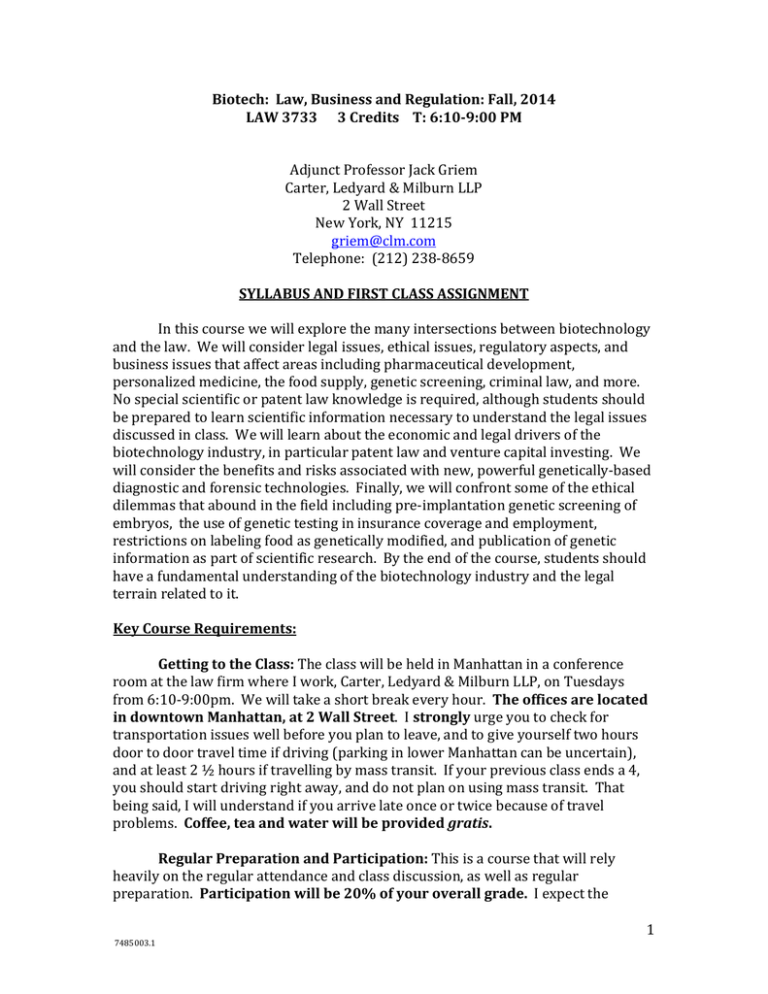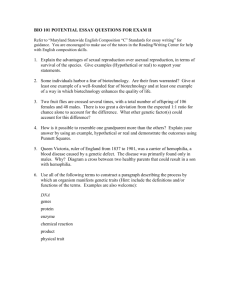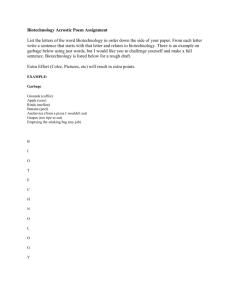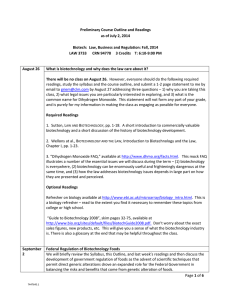Document 14121131
advertisement

Biotech: Law, Business and Regulation: Fall, 2014 LAW 3733 3 Credits T: 6:10-­9:00 PM Adjunct Professor Jack Griem Carter, Ledyard & Milburn LLP 2 Wall Street New York, NY 11215 griem@clm.com Telephone: (212) 238-­‐8659 SYLLABUS AND FIRST CLASS ASSIGNMENT In this course we will explore the many intersections between biotechnology and the law. We will consider legal issues, ethical issues, regulatory aspects, and business issues that affect areas including pharmaceutical development, personalized medicine, the food supply, genetic screening, criminal law, and more. No special scientific or patent law knowledge is required, although students should be prepared to learn scientific information necessary to understand the legal issues discussed in class. We will learn about the economic and legal drivers of the biotechnology industry, in particular patent law and venture capital investing. We will consider the benefits and risks associated with new, powerful genetically-­‐based diagnostic and forensic technologies. Finally, we will confront some of the ethical dilemmas that abound in the field including pre-­‐implantation genetic screening of embryos, the use of genetic testing in insurance coverage and employment, restrictions on labeling food as genetically modified, and publication of genetic information as part of scientific research. By the end of the course, students should have a fundamental understanding of the biotechnology industry and the legal terrain related to it. Key Course Requirements: Getting to the Class: The class will be held in Manhattan in a conference room at the law firm where I work, Carter, Ledyard & Milburn LLP, on Tuesdays from 6:10-­‐9:00pm. We will take a short break every hour. The offices are located in downtown Manhattan, at 2 Wall Street. I strongly urge you to check for transportation issues well before you plan to leave, and to give yourself two hours door to door travel time if driving (parking in lower Manhattan can be uncertain), and at least 2 ½ hours if travelling by mass transit. If your previous class ends a 4, you should start driving right away, and do not plan on using mass transit. That being said, I will understand if you arrive late once or twice because of travel problems. Coffee, tea and water will be provided gratis. Regular Preparation and Participation: This is a course that will rely heavily on the regular attendance and class discussion, as well as regular preparation. Participation will be 20% of your overall grade. I expect the 7485003.1 1 assigned readings and other work in preparation for each class will take approximately 2-­‐3 hours to complete. Please come to class prepared thoroughly and ready to participate. Lawyers must learn to talk intelligently about the law to clients and courts, and you should plan to practice that in class. I expect to call on everyone at least a few times during the semester. I will take attendance. Regular class participation, showing preparation and thought about the issues, will be half of your participation grade, or 10% of your overall grade. Brief Oral Presentation: Because there are so many areas where biotechnology and the law intersect, I will ask each student to give a brief (10-­‐15) minute overview on a legal topic selected by the student that will not be directly addressed in class, or on a current statutory or case law issue selected by the student, and then lead a 10-­‐15 minute class discussion. This presentation will count for half of your participation grade, or 10% of your overall grade. Required Materials: Victoria Sutton, Law and Biotechnology: Cases and Materials (Carolina Academic Press 2007) Wellons et at, Biotechnology and the Law (ABA 2007) I will also use articles and cases that can be found on the Internet Final Grades: Class Participation: 20%: This includes not just speaking in class and doing the brief presentation but also constructively listening, paying attention, etc. Exam: 80%: The Exam will be given at the school during the regular exam period. It will generally test your understanding of the issues and legal principles discussed in class. Office Hours: I do not have regular office hours at the law school. I am more than happy to schedule time to discuss issues by phone during the week, or to meet with you before class. If you would like to meet with me, send me an email and we can work out a mutually convenient time to meet. Computer Use Policy: Computers are to be used during class for taking notes and no other purpose. You are wasting everyone’s time (and your money) if you use them to surf the internet or send email or instant messages during class. Your cell phones should be off during class, you can check them during the breaks. Violations of this rule may lead to you being prohibited from using a laptop during class. 7485003.1 2 Preliminary Course Outline and First Class Assignment The Preliminary Course Outline, which includes readings and a brief summary of the focus of each class, is posted herewith. We will not meet in person for the first class on August 26. Instead, everyone should do the required readings for August 26 shown in the Preliminary Course Outline, study this syllabus and the Course Outline, and submit a 1-­2 page statement to me by email to griem@clm.com by August 27 answering three questions – 1) why you are taking this class, 2) what legal issues you are particularly interested in exploring, and 3) what is the common name for Dihydrogen Monoxide. The content of this statement will NOT form any part of your grade, and is purely for my information in making the class as engaging as possible for everyone. 7485003.1 3




